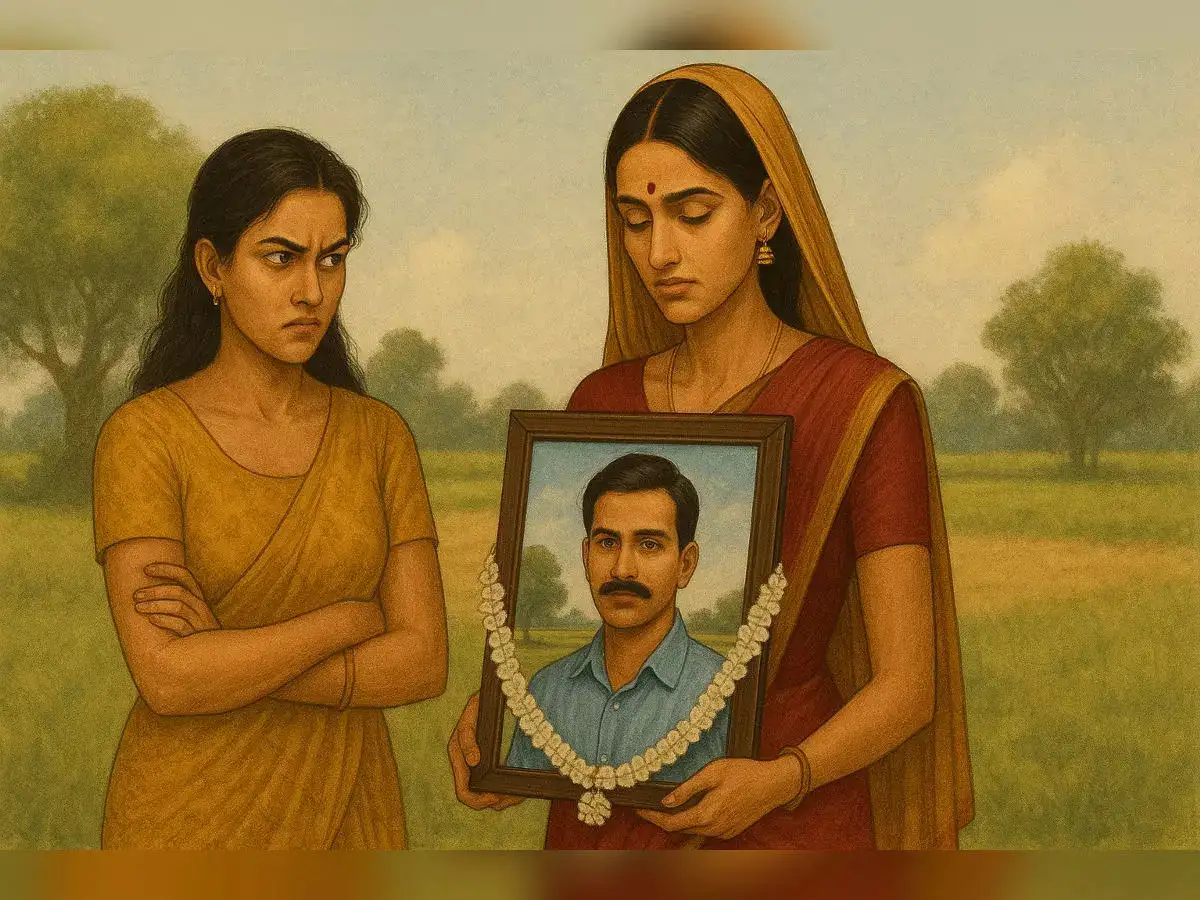Copyright indiatimes

In a significant judgment, the Odisha High Court has recently held that under Section 16 of the Hindu Marriage Act, children born from both first wife (valid marriage) and the second wife (voidable marriage) are entitled to a share in their father’s ancestral property. However, each child’s share would be limited to the portion that would have been allocated to the respective mother in a notional partition before their father’s death, as per Section 6(3). Income Tax GuideIncome Tax Slabs FY 2025-26Income Tax Calculator 2025New Income Tax Bill 2025This ruling came from a case where the Respondent- Anusaya Mohanty (first wife), initiated C.P. No. 576 of 2017 before the Family Court, Bhubaneswar, seeking a declaration that she is the legally wedded wife of the late Kailash Chandra Mohanty and his rightful legal heir. The Respondent, Anusaya (the first wife), claimed that her marriage to the deceased took place on June 5, 1966, as per Hindu rites and customs. They lived together as husband and wife and had two sons from the marriage. She further alleged that the Appellant, Sandhya Rani Sahoo (the second wife), was merely a nurse who worked with her late husband and did not have a legitimate marital relationship with him. The Family Court decreed the suit on October 29, 2021, declaring the Respondent, Anusaya (the first wife), as the legally wedded wife and legal heir of the late Kailash Chandra Mohanty (husband), entitling her to inherit his ancestral and self-acquired property. Aggrieved by the judgment, the Appellant, Sandhya (the second wife), filed MATA No. 96 of 2021 before the Odisha High Court, challenging the decision on the grounds that she was not given a fair opportunity to present her case. She contended that her lawyer had passed away during the proceedings, and because of the disruptions caused by the Covid-19 pandemic, she was unaware of the developments, leading to the case being decided in her absence. The Odisha High Court, in its order dated July 13, 2023, observed that there was a good reason for Sandhya (the second wife) not being present and held that the Family Court’s ruling was made without giving her a fair chance to argue her case.Additionally, the Odisha High Court issued an interim arrangement concerning disputed property. Considering the advanced age of both parties, with the Respondent, Anusaya (the first wife), approaching 80 years and the Appellant, Sandhya (the second wife,) around 70 years, the Odisha High Court directed that, until the final outcome of the case, the usufructs arising from the property would be shared in a 60:40 ratio, with 60% in favour of the Respondent, Anusaya Mohanty, and 40% in favour of the Appellant, Sandhya Rani Sahoo @ Mohanty. Following the remission, the Family Court reheard the matter and passed a fresh judgment on December 12, 2023, once again declaring the Respondent, Anusaya (the first wife), as the legally wedded wife of the late Kailash Chandra Mohanty and his legal heir, thereby reaffirming her right to inherit his ancestral and self-acquired property. As a result of the Family Court’s decision, the Appellant, Sandhya (the second wife), preferred the present Matrimonial Appeal, challenging the judgment.Also read: Rs 1.5 crore tax refund withheld by Income Tax Dept due to mismatch between ITR and Form 26AS; taxpayer files case, wins in High CourtDhruv Chopra, Managing Partner at Dewan PN Chopra and Co., told ET Wealth Online: “The Odisha High Court placed reliance on the decision of the Hon’ble Supreme Court in Revanasiddappa & Anr. v. Mallikarjun & Ors., 2023 LiveLaw (SC) 737, which addressed the question of whether children born from void or voidable marriages, though granted legitimacy under Section 16(1) and (2) of the HMA, could claim rights in ancestral property. The Supreme Court clarified that Section 16(3) of the HMA restricts the property rights of such children to:The self-acquired property of their parents, andThe share that would have fallen to the parent’s share in the joint family property.Chopra said: “This principle is based on the concept of notional partition, wherein, for determining the share of a deceased Hindu Mitakshara coparcener, the law assumes a partition took place immediately before his death. The share that would have been allocated to the deceased in such a notional partition forms the estate from which his heirs, including children legitimised under Section 16, may inherit.”Also read: Landlord wins tenant eviction case for providing signed rent receipts, despite tenant’s son not signing them: Supreme Court order explainedOdisha High Court frames three issues for considerationThe Odisha High Court, in its judgement (MATA No. 04 of 2024) dated April 2, 2025, said that the main three issues for consideration in this case are:(i) Whether the Respondent’s prayer for declaration of her marital status is maintainable before the learned Judge, Family Court, under Section 7 of the Family Courts Act, or whether she was required to approach the Civil Court under Section 34 of the Specific Relief Act? (ii) Whether the suit filed by the Respondent before the learned Judge, Family Court, is barred by limitation, having been filed more than three years after the death of Late Kailash Chandra Mohanty? (iii) Whether the direction of the learned Judge, Family Court, depriving the issues born from the Appellant (the second wife) from the properties of the late Kailash Chandra Mohanty, is violative of Section 16 of the Hindu Marriage Act?In this article, we have discussed issue no.3 i.e. the division of the ancestral property of the late husband.Also read: Bank withholds retired employee’s gratuity for someone else’s loan default; she wins in Odisha High CourtOdisha High Court said this about ancestral property of late husbandThe Odisha High Court said that the Appellant’s (Sandhya, the second wife) concern is that in the final order section of the Family Court’s judgment, it is only declared that the Respondent (Anusaya, the first wife) is the legal heir of the late Kailash Chandra Mohanty and entitled to inherit his ancestral and self-acquired property. The Odisha High Court: “However, despite discussion in the judgment, the Family Court has not clarified in the final order that the children born from the Appellant, Sandhya (the second wife), have a right over both ancestral and self-acquired property of the deceased.”The Odisha High Court said that in this regard, it is pertinent to examine the right of inheritance of such children under the Hindu Marriage Act, 1955, and the Hindu Succession Act, 1956 (HSA). The Odisha High Court said that Section 16 of the Hindu Marriage Act, 1955 (HMA), confers legitimacy on children born from void and voidable marriages, ensuring that they are entitled to inherit their parents’ property. Under the Hindu Succession Act, 1956, legitimate children, including those legitimised under Section 16 of the HMA, fall under the category of Class-I heirs, giving them an undisputed right to inherit the self-acquired property of their parents.Also read: Landlord wins 14-year-old tenant eviction case; Delhi High Court says “precise reason for personal use” not mandatory The Odisha High Court said that to better understand, reference to the case in the matter of Revanasiddappa & Anr. versus Mallikarjun & Ors., reported in 2023 LiveLaw (SC) 737, may be made, wherein the Hon’ble Supreme Court has dealt with the issue as to whether the children born from void or voidable marriages, though conferred legitimacy under Section 16(1) and (2) of the HMA, could claim rights in ancestral property or as coparceners under the HSA.The Odisha High Court said that the Hon’ble Supreme Court held that Section 16(3) of the Hindu Marriage Act, 1955, restricts the property rights of such children to only the property that comes in the share of the parents out of the joint family property, besides self-acquired property. To be more specific, the judgment further clarifies that where the parent was a Hindu Mitakshara coparcener, the explanation to Section 6(3) of the HSA comes into play.The Odisha High Court said that this means that before the devolution of the parent’s property, a notional partition must be presumed to have occurred immediately before the parent’s death, thereby determining the parent’s share in the coparcenary property. The Odisha High Court said: “Once the share of the deceased parent is ascertained through this notional partition, the legal heirs, including children born from void or voidable marriages, are entitled to their rightful share in such property.”Also read: Jobless wife wins Rs 15,000 monthly maintenance from ONGC employee husband earning Rs 74,000: Madhya Pradesh High Court orderOdisha High Court judgementThe Odisha High Court said that they find merit in the Appellant’s (Sandhya, the second wife) concern and deem it necessary to modify the Family Court’s order by incorporating a specific clarification. The Odisha High Court said: “This Court holds that the children born from the Appellant (Sandhya, the second wife) and the late Kailash Chandra Mohanty are obviously entitled to inherit his self-acquired property. Additionally, where the deceased parent was a Mitakshara coparcener, such children shall also inherit their share in the ancestral property, limited to the portion that would have been allotted to their parent upon a notional partition before their death. The Family Court’s order shall be modified to reflect this clarification.”The Odisha High Court said that in view of the above discussions, they find no merit in the Appellant’s (Sandhya, the second wife) other contentions.Also read: Wrongly terminated employee wins Rs 13 lakh compensation legal case even as company becomes insolvent Odisha High Court said: As a necessary corollary, the jurisdiction exercised by the learned Judge, Family Court, under Section 7(1)(b) of the Family Courts Act, is just and proper. Further, in view of our discussion as above on the issue of limitations, the suit is also not barred by limitation. Furthermore, the Family Court has correctly declared the Respondent (Anusaya, the first wife) as the legally wedded wife of the late Kailash Chandra Mohanty and his legal heir, entitled to inherit his ancestral and self-acquired property. As already discussed, the judgment dated December 12, 2023, by the Judge, Family Court, Bhubaneswar, is modified to the extent that the Appellant’s (Sandhya, the second wife) children have the right to inherit the self-acquired property of the late Kailash Chandra Mohanty, as well as their rightful share in his ancestral property, subject to the portion that would have been allotted to him upon a notional partition before his death, as per section 6(3) of the HSA.Accordingly, the appeal is dismissed on merit, and the impugned judgment is upheld with the aforementioned modification.Anju Gandhi, Senior Partner at SNG & Partners, said to ET Wealth Online: The Orissa High Court’s judgment in Smt. Sandhya Rani Sahoo @ Mohanty v. Smt. Anusaya Mohanty does not introduce a new legal principle but rather reinforces a settled position of law. The High Court discusses the rights of illegitimate Hindu children in the property of their deceased father alongside the rights of the legitimate spouse and children. Thereby it examines section 16 of Hindu Marriage Act, 1955 (HMA) and its effect on the Hindu Succession Act, 1956 (HSA). Under Section 16 of the HMA, children born from void or voidable marriages are deemed legitimate. However, Section 16(3) expressly limits such legitimacy by clarifying that it does not extend to rights in or to the property of any person other than the parents.Gandhi says that importantly, the High Court’s reasoning relies on the Supreme Court’s authoritative judgment in Revanasiddappa & Anr. v. Mallikarjun & Ors. (2023), which has conclusively settled the interplay between provisions of the HMA and the provisions of HSA. As a consequence, it has been settled in the SC judgment that such illegitimate children once legitimised under Section 16 of HMA are entitled to inherit the self-acquired property of their parents along with the joint family property/ ancestral property to the extent of their parent’s interest thereunder under HSA as they qualify as ‘related by legitimate kinship’, under Section 3(1)(j) of the HSA. This share of the joint/ ancestral property is determined by a notional partition of the property as computed under Section 6(3) of the HSA.Gandhi adds: "In doing so the SC disregarded the ratios in the case of Jinia Keotin, Neelamma v. Sarajamma & Ors and Bharatha Matha case where the courts limited the rights of the illegitimate children to a share in their parents' self-acquired property. In relying on this SC judgment, the Orissa High Court merely echoes the well-established legal framework and their decision should not be viewed as a development introducing a new right."The impact of the Orissa judgment from the perspective of illegitimate children is that the judgment ensures that in a bid to protect the ‘sanctity’ of marriage, innocent children born from void or voidable marriages are not denied their rightful share in their parents’ property (in particular their share to the parents’ ancestral property)On the other hand, from the perspective of the parents, the judgment reinforces the importance of clear succession planning in cases of complex family structures or multiple relationships. It encourages formal documentation such as wills and trusts to avoid ambiguity in succession right. Trusts particularly become relevant as based on the structuring they can additionally provide asset protection without exposing family wealth to prolonged litigation. Further unlike Wills, such protection can be achieved through trusts in the lifetime of the parent.



